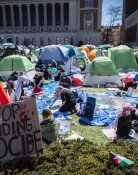Henry George’s curse
Henry George’s curse
Posted April. 01, 2019 08:52,
Updated April. 01, 2019 08:52
The real-estate policies of the current administration derive from the former administration of Roh Moo-hyun. Kyungpook National University professor Lee Jeong-woo, who served the first policy secretary for the former president, was a follower of Georgist philosophy of American political economist Henry George. George believed poverty and inequality came from monopoly of land ownership and denied private land ownership. It shows the past real-estate policies were based on ideological belief rather than the law of supply and demand.
Implementation of outdated socialist theories to matured market economy spawned troubles throughout society. The former Roh administration saw Seoul’s affluent Gangnam region as an area for speculation and condemned conservative groups and media. It also started using real-estate as an index of morality.
The incumbent Moon Jae-in administration specified public land ownership last year when proposing a constitutional amendment, which was a revival of Henry George. Henry George’s concept of public land ownership spread beyond Gangnam to those who own multiple homes. The government’s demand to “sell houses owners don’t leave in,” which came with a due date shows that the standard on real-estate is becoming stricter. Henry George’s philosophy pervades every aspect of our society.
It is unclear whether the Georgist approach has stabilized housing prices. The Moon administration at least succeeded in establishing a social norm that social leaders should not engage in greedy investment, but the problem is that the norm is becoming too political.
The Roh administration had failed to seat many candidates, such as former deputy finance minister Lee Heon-jae, former minister of construction and transportation Kang Dong-suk, former head of the national human rights committee Choi Young-do, just because of their real estate investment made several decades ago. According to the current administration’s standard, President Moon Jae-in and Minister Kim Hyun-mi of Land, Infrastructure and Transport who used to own two houses are also potential speculators who disturb the market. Ten ministers were even called “ministers of multiple houses,” which is irrelevant from their job performance. Former deputy prime minister Kim Sang-gon who owns multiple houses in Gangnam, may be called a “speculator,” but it would not be fair to include Minister Do Jong-hwan of Culture, Sports and Tourism in the same group because he owns a house in the countryside.
Former presidential spokesperson Kim Eui-kyeom was dismissed last week because of real-estate investment, and two minister candidates were brought down along with him. Now is time for us to think about this issue. The government used real-estate as a tool for ideology, morality and politics, which rendered policies meaningless and fanned political disputes. Both parties applied strict rules to others and some even had to leave the office by investing in real-estate. If the Moon administration did not regard real-estate policies as a political movement, this would not have happened. Social loss coming from the endless political football is too big to ignore.
Society condemned Kim as immoral, but he did not apologize for what he did. Chances are, he thinks he is caught in a political trap because real-estate became a tool of political strife. Many candidates who lost due to the same reason say so at private occasions.
I hope we could separate morality and politics from real-estate. I am not suggesting us to go backwards, but it is time that we unshackle ourselves from the strange philosophy that calls those owning more than one house speculators. It would unburden the market and free ourselves from political disputes. Otherwise, Henry George’s 100-year-old philosophy would continue to curse our society.
koh@donga.com
Headline News
- N. Korea launches cyberattacks on S. Korea's defense companies
- Major university hospital professors consider a day off each week
- Italy suffers from fiscal deficits from ‘Super Bonus’ scheme
- Inter Milan secures 20th Serie A title, surpassing AC Milan
- Ruling and opposition prioritize spending amid tax revenue shortfalls







